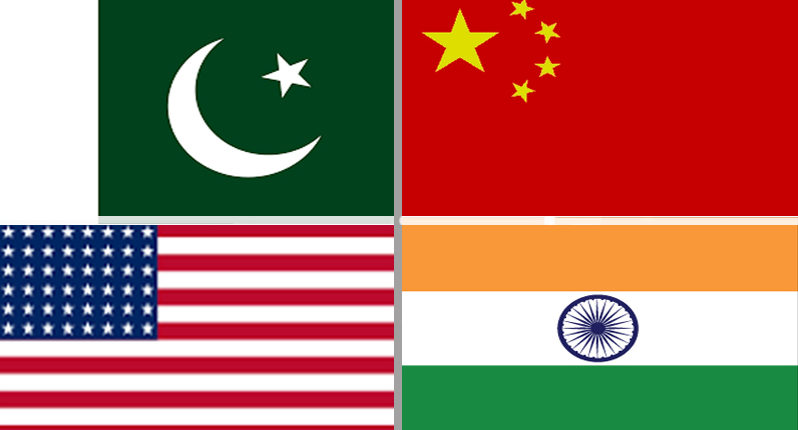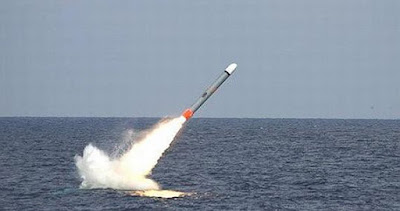Pakistan’s nuclear weapons status ranked it first in the Muslim world, second in the South Asian region and seventh in the international system. The nuclear journey of Islamabad was completed in 1998 when the New Delhi–initiated nuclear race dragged Pakistan toward an unending armed competition in South Asia. Islamabad’s desire to acquire nuclear weapon status for strengthening of its national security while defending its sovereign values against potential rivals was introduced by the tenth Prime Minister Zulfikar Ali Bhutto and the successful acquisition of nuclear weapon status was declared by the thirteenth Prime Minister Nawaz Sharif. The threat from the rival state adjoined to its border was the fundamental reason that drove Islamabad to obtain nuclear weapon capability for its security and survival. India, situated at the Eastern border of Pakistan, by defining its quarrelsome policy of confrontation for neighbouring countries posed a security threat to Pakistan. Its belligerent designs of regional dominance led New Delhi to adopt aggressive foreign policy towards neighbouring states. Pakistan was the State most affected by Indian attitude, has always tried to protect its position in the regional and international politics.
In order to counter the hostile behaviour of New Delhi, the quest for appropriate security against Indian provocative approach has always remained Pakistan’s foremost and preferred policy. Indian opposition to Pakistan is not limited to South Asia but New Delhi has taken steps to undermine Islamabad’s role in the world politics. Anti–Pakistan lobbies backed by India are trying to isolate Pakistan in the international community by influencing the people from world’s capitals. In response to this antagonistic attitude of New Delhi, Islamabad was unwillingly forced to globally pronounce its nuclear armed status. In post– nuclearized environment, the state authorities from Islamabad are prepared to take every step against the regional hegemonic aspiration of India. The present policies of New Delhi, in this way, are taking the regional politics of South Asia towards the waters. The Indian launching of a nuclear submarine moved Pakistan to strategically respond India accordingly.

On January 2017, the test of Submarine Launched Cruise Missile (SLCM), Babur-3 in Indian Ocean provided a survivable and credible second strike capability to Pakistan. Babur–3 (a sea based missile) with the range of 450 kilometres is capable of delivering different types of payloads, and it has augmented the deterrent capabilities of Pakistan. This sea–based cruise missile Hatf VII is an appreciable addition in the existing deterring power of Islamabad. It is a remarkable effort to extend the role of Naval Strategic Forces Command (NSFC) of Pakistan in protecting the country’s maritime interest. The protection of maritime assets became a serious challenge for government of Pakistan after 2009 when a new dimension was added to the ongoing armed competition of South Asia, New Delhi stretched its strategic muscles in Indian Ocean by attaining nuclear–powered ballistic missile submarine (Arhiant). The launching of Arhiant class submarine, an Advanced Technology Vessel (ATV), is the first ballistic missile capable submarine in South Asia which has altered the regional strategic culture.
Efforts to empower the role of Indian Blue Water Navy were introduced in the last decade of the twentieth century. Naval project of Advanced Technology Vessel for the designing of Arhiant class submarine was confirmed in 1998, the same year the Indian nuclear weapons status proclaimed globally. The notion of blue water navy and acquisition of blue water capabilities was formally coined in 2007 under India’s Maritime Capabilities Perspective Plan of India. The Indian Ocean witnessed the extended role of Indian naval forces in the areas of Persian Gulf, Horn of Africa, and Strait of Malacca. The probable expectation of New Delhi attached to Arhiant has evidently disturbed the South Asian strategic equilibrium instead of contributing to the stability of regional nuclear balance. It has also highlighted the New Delhi’s dangerous and destabilizing planning vis-à-vis peaceful ambitions of Pakistan.
The submarine powered by pressurised water reactor with highly enriched uranium fuel was launched in 2009 and commissioned in 2016. The enactment of sea–based deterrence in the emerging political patterns of Indian Ocean has vividly announced Indian ambitions to join the group of states with nuclear triad capabilities. While this might have increased Indian role in world politics it has deteriorated the regional strategic culture of South Asia. This move has also jeopardized the security of neighbouring states generally, and affected Pakistan’s position particularly.
An American Rear Admiral and globally renowned naval strategist, Alfred Thayer Mahan has called the Indian Ocean – a key to control the seven seas of the world, whoever controls the Indian Ocean will hegemonize Asia while actively enhancing its influence in evolving world politics. The strategic significance of Indian Ocean Region (IOR) which is not merely restricted to economic competition of great powers has become an area of immense importance for key players. Because thirty 36 surrounded the Indian Ocean, India wants to control the IOR, this has become an unstoppably disturbed strategic mind-set of New Delhi.

Great powers and potential aspirants of effectively influencing the politics of Indian Ocean by overseeing the opposing claims of each other are many. Beijing, Washington, New Delhi and Islamabad are major states that involved in a race to control the IRO. Four nuclear powers are now rapidly moving toward maritime competition. As described by Mahan, the escape from maritime conflicts is easy to imagine but difficult and hard to practice. Pakistan entered late in the maritime politics of India–China–US. Three states with triad nuclear capabilities are now moving towards the Arabian Sea while fighting in South China Sea. The signing of economic corridor agreement with China and building of Gwadar port has dragged Pakistan towards maritime issues in which Islamabad decided to match its naval capabilities with New Delhi. Moreover, Indian maritime aggression in the form of Arhiant (armed with ballistic missiles) urged Pakistan to emphasize the security of Islamabad’s maritime borders while prioritizing the naval defence in the mainstream policies of the country. The maintenance of a robust naval force equipped with advanced conventional and non- conventional armed capabilities can secure Islamabad’s oceanic boundaries. This realization has Islamabad to declare the successful test of SLCM, Babur – 3 which is commonly known to be a reliable way to announce a nation’s strength for appropriate protection of its sea – based values and assets. Pakistan’s attentions toward emerging oceanic political order of South Asia has not only enabled Islamabad to avert unfriendly moves of other states, but it will also enhance Pakistan’s role in the changing the dynamics of international system. An advanced role of a naval force under robust command can further fortify the defence posture of the nation which can keep the regional strategic balance in the waters as well.
Under a multinational plan for enhancing Islamabad’s role in the water, the state authorities recently hosted the international community in the Arabian Sea. The sixth naval exercise (Aman–17) under the slogan of “Together for Peace” invited the navies of 71 countries to participate in a four–day exercise, and support Islamabad’s preparedness for addressing of multidimensional future challenges of Indian Ocean. The multi–states naval cooperation showed the backing of international community to Pakistan’s peaceful vision of regional maritime order of South Asia. While located between nuclear states equipped with triad capabilities, it is not easy and not impossible for Pakistan to join the international club of nuclear states with matured nuclear triad forces. Pakistan’s recognition as a triad power can further lead Islamabad to secure the maritime future of the nation in the presence of growing economic and strategic politics over the waters.
Four nuclear powers–India, Pakistan, United States, and China are involved in an unstoppable completion. The combination of economic and strategic interests have formulated a complex web of contesting behaviours cemented in bilateral alliances. The New Delhi–US strategic partnership has simultaneously resulted in Islamabad–Beijing cooperative relations on the one hand. On the other hand, parallel to the Chinese and American bilateralism towards Pakistan and India, China’s growing economic collaboration with both Pakistan and India, along with American strategic relations with both India and Pakistan are portraying a multifariously complex South Asian order. The role of the great powers is constantly altering the South Asian strategic culture in which Russia is also an intended candidate equipped with appropriate potential for securing its own interests in the South Asian subcontinent, it is also determined to counter the role other great powers.
The evolving regional order of South Asia in the presence of multifaceted economic and strategic contest of sub–regional and extra–regional players has propelled Pakistan to further enhance its defensive muscles. A strong naval command equipped with nuclear capabilities can let rival states think a hundred times before planning a surprise naval attack to harm Pakistan’s position in the seas, because Babur–3 has clearly declared Islamabad’s invulnerable standing in the waters of South Asia. In response to Arhiant, Babur showed Islamabad’s intent of restoring and stabilizing the regional strategic equilibrium between India and Pakistan. Therefore, the future of South Asian politics in the waters of IOR has become an undeniable reality and a serious challenge for Pakistan which could be overcome by taking more steps for enlargement of Islamabad’s role in adjoined waters.




